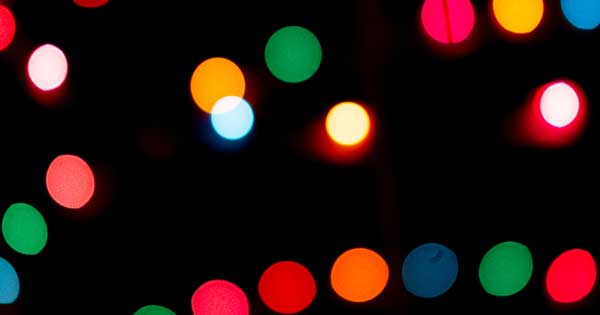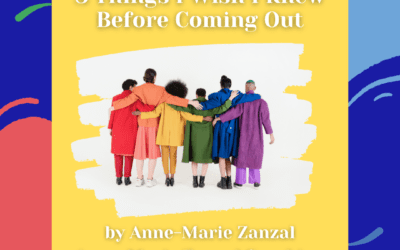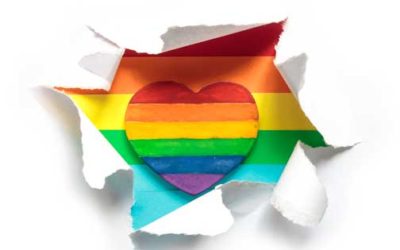Like many queer people, my partner, Tonda, and I sat down to watch the lesbian romantic comedy, Happiest Season, on Hulu. Tonda has been out for thirty-five years and I am out for five; we are both in our mid-fifties.
We found the movie problematic for so many reasons, both of us wishing for a lesbian movie without all the trauma. My partner Tonda, a veteran of many of these movies, kept waiting for “a tree to kill the butch” as in the movie The Children’s Hour from 1961. Although I could delve very deeply into what is wrong with the movie, there is one thing they got very right.
Coming out is Different for Everyone, but it Isn’t Always Easy
I am a late bloomer and I came out when I was about fifty; you can read my story here. It was a very difficult time where I let go of my life as a perceived straight married woman; mom of four, UCC minister and finally admitted who I was created to be. What happened after sharing the sacred story of my sexuality with family and friends was a mixed bag. Some were supportive, others not so much. The most important people to me, my children, went from accepting to rejecting. I realize they also struggled with my divorce from their Dad, but they also had to battle their own struggles with homophobia. Like many of us, they were queer allies; but things changed for them when it was their mom who was identifying and living as an out lesbian.
The Effects if Being Outed by Someone Else
Tonda was outed by a family member to her parents when she was twenty-two. Like Harper, who is viciously outed by her sister in the movie, she had no choice in the matter. What happened next was incredibly painful and difficult in so many ways. Both sets of parents disowned her. She was raised in the southern part of the United States and her father’s side were conservative Southern Baptist. She had just graduated from college. She was working for her mom and step father, her car and home were in their names, and they took away both. Suddenly she went from slightly spoiled, beloved child, to someone who neither set of parents would have anything do with or support. She reminisces about rolling pennies for gas money with her girlfriend so she could get to work. Eventually after three years she reconnected with her mom, she has never reconnected with her father and he still refuses to speak with her.
The assumption of Compulsory Heterosexuality Keeps Many of us From Coming Out
We are coming out in a world where compulsory heterosexuality is what every single person experiences. Poet/Academic Adrienne Rich writes about it Compulsory Heterosexuality and Lesbian Existence. “Compulsory” means required or obligatory and “heterosexuality” means the assumption that all romantic relationships are between a man and a woman. You can read more about this here.
When we are born the expectation for almost every human being is that we are straight (heterosexual) and we will fall in love and partner with someone of the opposite gender. It is everywhere, in our families, schools, communities, churches, laws, etc. It is this assumption that keeps many of us from coming out and for some of us it takes a while for us to work through the various restrictions we often put open ourselves before we can make move forward into authenticity.
The Terrifying Moment of Sharing Your Truth, For the First Time
In Happiest Season Harper is bringing home her girlfriend Abby for the holidays. The problem is Harper has not told her parents yet that she is gay. Abby is fully out for years and, we learn, had very supportive parents. Harper forces Abby essentially to go back into the closet as she returns home with her. Harper also is emotionally awful to Abby during the entire movie and at one point Abby decides to leave and is given advice by her friend John, played by Dan Levy (who I believe stole the movie with this one scene).
(VIDEO OF SCENE FROM YOUTUBE – embedded)
<iframe width=”560″ height=”315″ src=”https://www.youtube.com/embed/HUq35H9EqjM” frameborder=”0″ allow=”accelerometer; autoplay; clipboard-write; encrypted-media; gyroscope; picture-in-picture” allowfullscreen></iframe>
Where this movie got right is about coming out is that everyone in the LGBTQIA+ family understands that terrifying or difficult moment when we share our truth to that first person. Once this is shared one chapter ends and a new one begins, even if we don’t tell another soul for years. We will never unknow this truth about ourselves, even though we may remain closeted. In my work with people coming out later in life I find those who struggle, and yes suffer the most, are those who are half in and half out of the closet. We are often staying in straight marriages or hiding from family members in the misguided attempt to keep everyone “happy.”
Coming Out Isn’t About Others, It Is About US
Many of us in the queer community get this choice, but Harper and my partner Tonda did not get the opportunity to tell their truth, that moment was stolen from them. Ironically in the movie Harper outed her girlfriend Riley when they were in high school, something she appears to slightly regret, but the full weight of what Harper has done is not brought home until the same happens to her. Having our truth revealed without our consent is simply wrong and should not be done.
The movie also got right, when John tells Abby “Harper’s not coming out to her parents is nothing about you.” We need to remember that our coming out isn’t about our parents, our spouse, our children, our friends, our siblings or our community. Coming out is about us, who we are, and our emotional, physical, intellectual and spiritual needs as human beings. Other people’s happiness does not relay on us denying our sexuality. Their happiness relays on their own emotional work in life. This is what I learned as a mom with children when I came out: Change may occur in our families, but we are not destroying or “blowing them up.” We need to live our lives as who we are created to be and as psychoanalyst Carl Jung said “The greatest burden a child must bear is the un-lived life of its parents.”
Anne-Marie is a coming out coach and provides emotional and spiritual support for those who identify as women coming out to the LGBTQIA+ community. You can contact her at amazanzal@gmail.com or book a call here to discuss the options.




